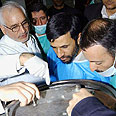
IAEA meets to discuss Iran nuclear stalemate
UN atomic watchdog begins traditional September board meeting in Vienna to discuss current standstill in long-running investigation into Tehran's controversial atomic drive. Attendees also expected to hear update on state of probe into Syrian facility
The meeting, which is slated to run all week but could be wrapped up as early as Wednesday, according to some diplomats, is also expected to hear an update on state of the International Atomic Energy Agency's probe into Syria.
Syria - which the US alleges had been building a secret nuclear facility until it was destroyed in a bombing raid by Israel - is not officially on the agenda.
Nevertheless, IAEA Director General Mohamed ElBaradei is expected to update the 35-member board on the state of the investigation during his opening address on Monday.
Finally, the governors are set to discuss ElBaradei's latest report on Libya, which abandoned a clandestine nuclear weapons program in 2003 and has cooperated openly and fully with the agency in clearing up any outstanding questions ever since.
As at previous board meetings, it will be the Iran dossier that will dominate proceedings after a new report by ElBaradei accused Tehran of stalling the IAEA's investigation, refusing to provide access to documentation, individuals or sites which could reveal the true nature of its activities.
The watchdog has been investigating the Islamic republic's contested nuclear drive for five years, but has so far been unable to determine whether the program is entirely peaceful as Iran claims.
At the moment, the agency and Iran are - in the words of a senior official - "gridlocked" over Tehran's refusal to provide proof that it was not involved in studies to make a nuclear warhead, as a wide range of intelligence suggests it was.
Important new indications
A number of diplomats accredited to the IAEA have spoken of the agency's increasing frustration that Tehran has done little more than dismiss the so-called "alleged studies" as "false" and "fabricated".
The IAEA said it has obtained important new indications that an unidentified foreign expert may have assisted Iran in experiments on high explosive testing "suitable for an implosion type nuclear device".
Diplomats who attended a special technical briefing this week said the IAEA's head of inspections in the Middle East region, Herman Naeckerts, showed them documents and photographs suggesting Iran secretly tried to modify a missile cone to fit a nuclear bomb.
Furthermore, Iran has refused IAEA requests to interview engineers involved in the work and visit their ostensibly civilian workshops.
For its part, Iran continues to assert that the intelligence is forged.
Another moot point for the IAEA is Iran's refusal to suspend uranium enrichment, a process that can be used to make the fissile material for an atomic bomb.
Indeed, Iran has installed additional cascades of uranium-enriching centrifuges, bringing the number up and running to close to 4,000, and was testing more advanced centrifuges as well.










